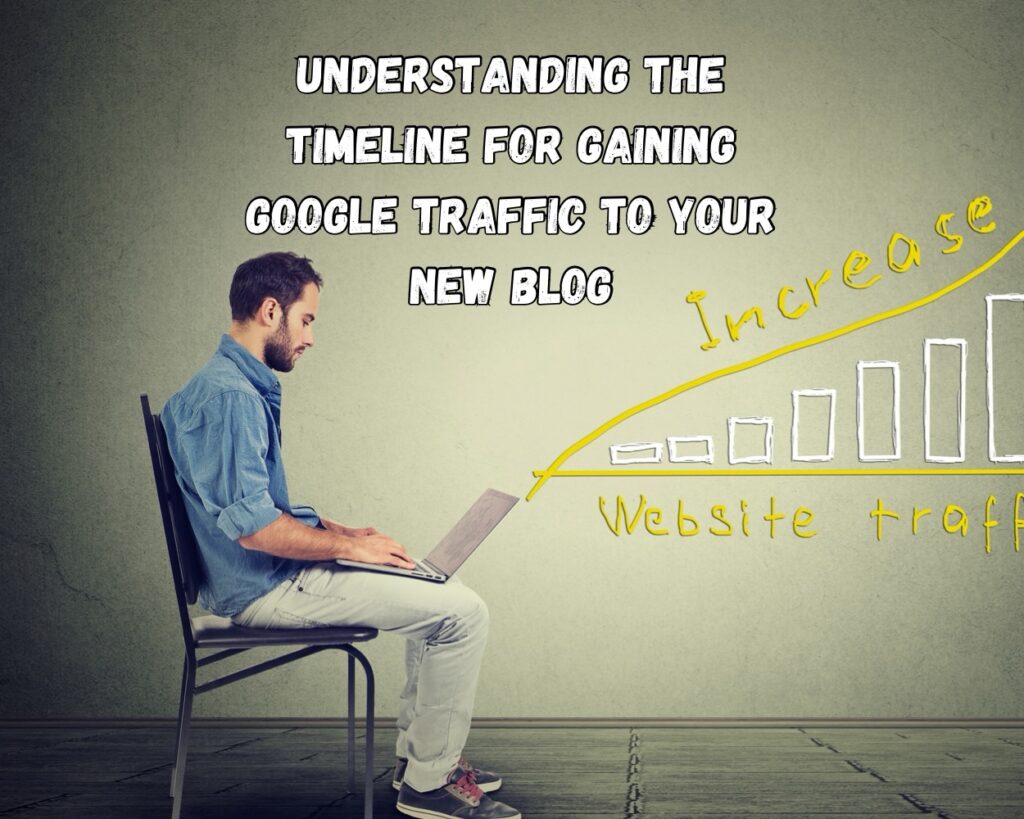Starting a new blog is an exciting venture, but it’s important to have realistic expectations about how long it will take to start seeing significant traffic from Google. While your SEO might be pretty good, there are several factors that influence how quickly your blog gains traction in search engine rankings.

Initial Phase: 0-3 Months
In the first few months, your blog is in its infancy stage. During this period, Google is still discovering and indexing your content. It’s unlikely that you’ll see much organic traffic from Google at this stage, as your site is still building authority and trust.
- Focus on Content Creation: Concentrate on producing high-quality, SEO-optimized content.
- Indexing: Ensure that your site is indexed by Google. Use tools like Google Search Console to monitor your site’s presence.
Early Growth Phase: 3-6 Months
By now, Google has indexed some of your content, and you might start seeing a trickle of traffic. However, this is still a very early stage in your blog’s life.
- Content and Keywords: Continue adding content regularly, focusing on long-tail keywords which are less competitive.
- Building Links: Start building backlinks to your blog. Guest posting and collaborations can be effective strategies.
Developing Phase: 6-12 Months
This is when you might start seeing more noticeable improvements in your traffic, provided you’ve been consistently publishing content and following SEO best practices.
- Content Depth and Quality: Google favors content that provides value to readers. Ensure your posts are thorough, informative, and engaging.
- User Engagement: Encourage comments and shares, as these can signal to Google that your content is valuable.
Growth and Maturity Phase: 1-2 Years
After a year or more, your blog should start gaining more substantial traffic from Google, assuming you’ve maintained a steady stream of quality content and good SEO practices.
- Authority in Your Niche: As your blog grows, it should start to become recognized as an authority in its niche.
- Refined SEO Strategies: Continue refining your SEO strategies based on analytics and changing trends.
Beyond 2 Years
Beyond the two-year mark, if you’ve been consistent and strategic, your blog should be well-established with a steady stream of organic traffic from Google.
- Sustained Efforts: Continue producing quality content and updating older posts.
- Adapt to Changes: SEO is not static. Keep abreast of the latest trends and algorithm updates.
Factors That Can Influence the Timeline
- Niche Competition: Highly competitive niches might take longer to break into.
- Content Frequency: The more frequently you post quality content, the quicker Google is likely to index and rank your pages.
- SEO and Technical Health: Good SEO practices and a technically sound website (fast loading, mobile-friendly, secure) are crucial.
- Backlinks: High-quality backlinks from reputable sites can significantly boost your SEO efforts.
The journey to gaining normal Google traffic for a new blog is gradual and requires patience, consistent effort, and a strategic approach to SEO and content creation. While the timeline can vary greatly depending on numerous factors, most blogs can start to see a steady increase in organic traffic within 6 to 12 months, with more significant growth typically occurring after the first year. Remember, SEO is a long-term game, and the key is to stay committed and adaptable to the ever-evolving landscape of search engine optimization.
Common Questions About Gaining Google Traffic for New Blogs
How Long Before Google Consistently Ranks My New Blog Posts?
It typically takes between 3 to 6 months for a new blog to start ranking consistently on Google, provided you are regularly publishing SEO-optimized content. Google’s algorithms need time to assess the quality and relevance of your content. As your blog gains more authority and backlinks, the time it takes for new posts to rank can decrease.
Can Social Media Accelerate My Blog’s Visibility on Google?
Yes, social media can play a role in accelerating your blog’s visibility. While social media signals are not a direct ranking factor for Google, they can lead to increased exposure, more traffic, and potentially more backlinks to your blog. These indirect effects can positively influence your SEO efforts.
Is Posting Frequency Important for Gaining Faster Google Traffic?
Posting frequency is important, especially in the early stages of your blog. Regularly publishing quality content can speed up the process of indexing and ranking. However, quality should not be sacrificed for quantity. It’s better to post less frequently with high-quality, valuable content than to post frequently with mediocre content.
How Crucial Are Backlinks for New Blogs in Terms of SEO?
Backlinks are crucial for new blogs as they signal to Google that other websites consider your content valuable and authoritative. Focus on gaining high-quality backlinks from reputable sites in your niche. This can significantly improve your search engine rankings and accelerate your blog’s visibility.
What Role Does User Engagement Play in SEO?
User engagement, such as time spent on your site, bounce rate, and interaction (comments, shares), can indirectly influence your SEO. Google views these signals as indicators of the quality and relevance of your content. Encouraging user engagement can thus have a positive impact on your rankings.
Should I Focus on Long-Tail Keywords for My New Blog?
Yes, focusing on long-tail keywords can be particularly effective for new blogs. These keywords are less competitive and more specific, which means they can be easier to rank for. They also tend to attract more qualified traffic, as they are more specific to user intent.
How Important Is Mobile Optimization for SEO?
Mobile optimization is extremely important for SEO. Google predominantly uses mobile-first indexing, meaning it primarily uses the mobile version of content for indexing and ranking. A mobile-friendly blog is essential not just for SEO, but also for providing a good user experience.
Gaining traffic from Google for a new blog is a gradual process that requires a strategic approach to content creation, SEO, and user engagement. Understanding the nuances of how Google ranks content and adapting your strategy accordingly can significantly impact the growth and success of your blog. Patience and consistency are key, as well as staying informed about the latest SEO trends and best practices.
As an Amazon Associate we earn from qualifying purchases through some links in our articles.




